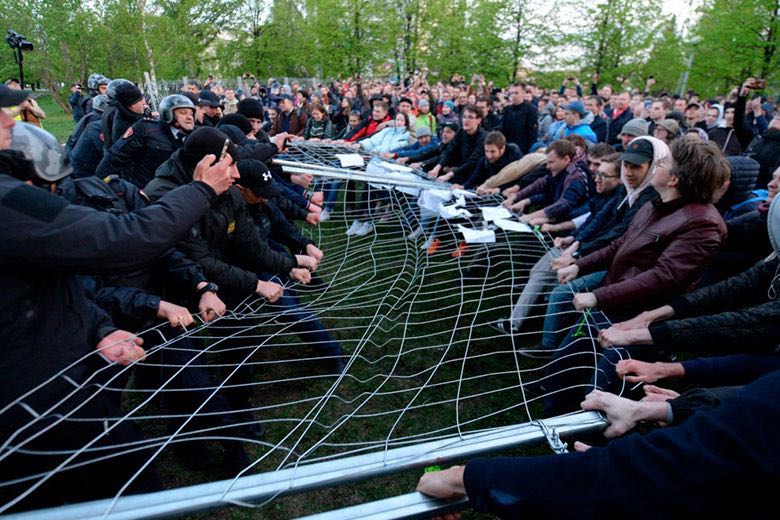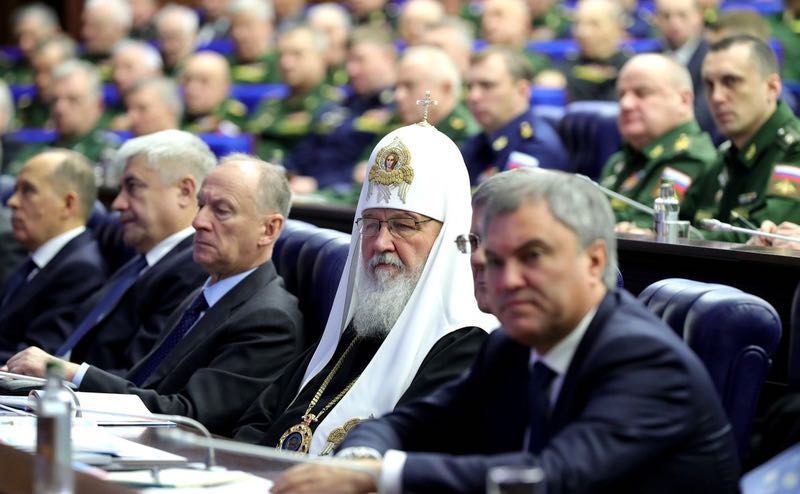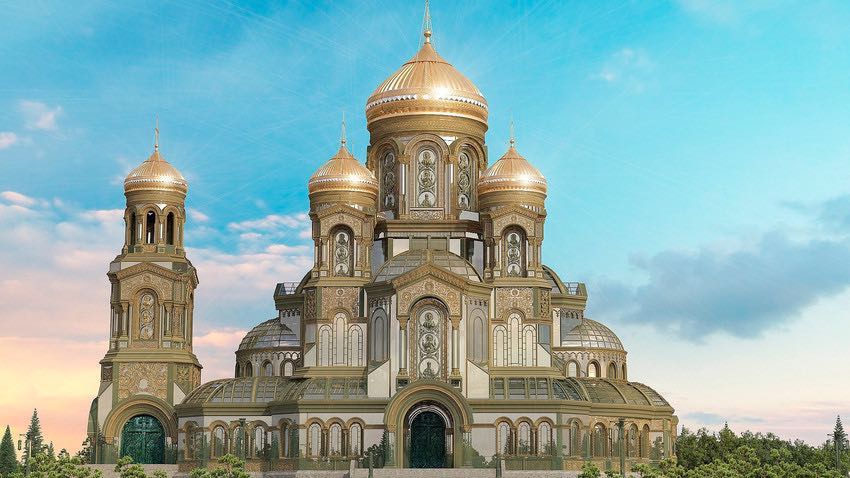The Russian Orthodox Church was always an arm of the state. But after the collapse of communism it grew greedy fingers of its own and factually became the state corporation RosBog (GodofRussia), argues our columnist Mark Galeotti. But even in the God-business state enterprises are not sacrosanct anymore. As the succesful protests against the umptieth church in Ekaterinburg have shown, shareholders can back down. This was an onion dome too far.
 After days of protests against the construction of a cathedral in a beloved parc in Yekaterinburg the Church backed down
After days of protests against the construction of a cathedral in a beloved parc in Yekaterinburg the Church backed down
The Russian Orthodox Church has long had a close, even symbiotic relationship with power. Even during Soviet times, after all, the boundaries between secular and spiritual authority were blurred almost to invisibility, and Vladimir Putin’s regime has continued the traditional alliance between Church and Kremlin. The Church and its grandees have done very well out of this in material terms, but arguably by allowing it to become in effect another state-controlled enterprise, somewhere between a media conglomerate and a holding company, it risks both losing its moral mandate and alienating the very power structure to which it has sold itself.
An historical alliance
The fall of Constantinople to Mehmet II’s Ottomans in 1453 left the Russian Church claiming to be the last true bastion of Orthodox Christendom, with Moscow as the 'Third Rome' (as the 'First Rome' had initially been sacked by barbarians, and then become home to the Catholic popes). This coincided with the state-building aspirations of the Muscovite princes: Ivan IV – Ivan the Terrible – had first called himself tsar, emperor, in 1547 and he enthusiastically took upon himself the roles of both master and guardian of the Church. The Church, in turn, not only gained privileges and protection for itself, it felt a genuine duty to support Moscow, as the last bastion of Orthodoxy.
This close relationship, with the Church often little more that the spiritual cheerleader of the Crown, lasted through to 1917 when, not surprisingly, the Bolsheviks treated the priests as much as their enemies as the aristocrats. Marxism-Leninism became the new legitimating faith. However, when Axis forces crushed across the Soviet border in 1941, Stalin hurriedly sought to mobilise every resource at his disposal, including both Russian nationalism and Orthodoxy.
Churches were opened, priests released from labour camps, and suddenly religion was acceptable again. Only up to a point, of course, and only under state control. There were convinced believers and brave champions of human rights and religious freedoms within the Church, including the dissident priests Gleb Yakunin and Alexander Men. However, the bitter joke in the post-war USSR was that every bishop was a KGB colonel (they weren’t all, but some were) and every metropolitan aspired to be a general (they didn’t all, but some might).
When the Soviet Union collapsed, the Church experienced a resurgence, both because of the spiritual and ideological void left by the collapse of the communist experiment, and also thanks to direct support from Boris Yeltsin’s government. A restitution programme saw churches and other properties returned to its control, it established its own businesses (often with generous tax breaks), and once again began operating freely across the country.
Corporation RosBog
It has been under Vladimir Putin and, especially, Metropolitan Kirill, who was elected in 2009, that the Kremlin-Church alliance has been most striking. Kirill full-throatedly endorsed the 2014 annexation of Crimea and condemned the alleged 'persecution' of Russian-speakers in the Donbas. Indeed, religious themes were heavily employed in the early years of the Donbas war to attract and motivate volunteers and mercenaries, which also helps explain why, in January 2019, the Orthodox Church of Ukraine formally removed itself from Moscow’s authority.
 Patriarkh Kirill is boardmember of the Ministry of Defense (picture ministry of Defense)
Patriarkh Kirill is boardmember of the Ministry of Defense (picture ministry of Defense)
Overall, it has taken on the role of not just a state church, but a veritable religious conglomerate. As well as churches, monasteries, seminaries and other religious institutions, the church operates factories providing religious goods that are, in turn, recommended to worshippers. In 2007, it set up the TV channel Spas, and is part-owner of an advertising agency. But this is hardly the limits of the Church’s business empire. It traded BMW cars as a co-founder of BMW Rusland, it owns and runs hotels in Moscow and a computer centre in Novokuznetsk. It even used to own a granite quarry. Furthermore, it receives direct support from the government as well as private donors, with building a church now seemingly the approved way of demonstrating loyalty and affluence simultaneously. Back in 2014, official data showed it earning 5.6 billion roubles (€77.5 million) in revenues from services, sales and donations – and all of it is untaxed. Praise be.
In the process, it is often hard to know quite when matters spiritual end and those commercial begin. It also confuses the relationship of church and state. After all, even while professing its loyalty to Putin personally – 'a miracle of God', Kirill has several times described him – and his policies, the Church clearly has its own interests, which it will assert and defend. The decision in 2012 to charge three members of the Pussy Riot punk band with aggravated hooliganism, for example, represented the outcome of lobbying by Kirill himself, as the judicial authorities had initially planned to downplay the incident.
In many ways, after all, the Church operates like a FGUP, a Federal State Unitary Enterprise, a distinctive structure established for key combines working on the boundaries of state and business, like Pochta Rossii (Russian Post) and Atomflot (which operates the countries nuclear icebreakers). FGUP RosBog (Russian God) is certainly a worthy addition to the commercial pantheon, especially as this mingling of business and governance is not that unusual within the Russian adhocracy, after all. The Rosgvardiya may be Putin’s Praetorian Guard, but it also controls FGUP Okhrana, the country’s largest private security provider. Evgeny Prigozhin’s Concord Group may be a commercial provider of everything from catering to management consulting, but it also runs Wagner, the Kremlin’s deniable mercenary force.
Like most corporations, 'RosBog' maintains a variety of relationships of its own, distinct from its vertical one with the Kremlin. It interacts with numerous ministries, for example. Defence minister Sergei Shoigu quickly demonstrated a willingness to work with the church, and just as we have seen priests blessing missiles and learning to drive armoured vehicles. However, in an interesting sign of where RosBog fits into the hierarchy, despite certain misgivings, it has had to throw its weight behind Shoigu’s grandiose project to build the Main Cathedral of Russian Armed Forces at the Park Patriot military exhibition centre outside Moscow. What will become the country’s third-tallest cathedral is due to be opened in May 2020, for the 75th anniversary of the Great Patriotic War, symbolising the fusion of military, nationalist and religious traditions.
 Project for Main Cathedral of Russian Armed Forces at the Park Patriot military exhibition centre outside Moscow
Project for Main Cathedral of Russian Armed Forces at the Park Patriot military exhibition centre outside Moscow
That Shoigu has managed to line up so many donors to the project – including Putin himself, who reportedly funded the main icon, as well as oligarchs such as Alisher Usmanov and major corporations such as Gazprombank and LUKoil – demonstrate less genuine faith so much as the defence ministry’s capacity to wield its own strength and also leverage that of the Church. Whether because it is forced to or because it chooses to, RosBog has an intangible authority that is part of its bankable assets, and institutions from the Interior Ministry (which also has its own church-building programme) to local authorities (which frequently turn to the church to support their own initiatives) turn to it for that.
This also means that it can draw on a number of prominent oligarchs and minigarchs professing their faith, whether for information, donations, or leverage of its own. Former Russian Railways chief Vladimir Yakunin, Tsargrad-TV owner and self-professed backer of the Crimean coup Konstantin Malofeyev, copper magnate Igor Altushkin and a host of others are closely linked with the Church.
After Ekaterinburg
Thus, RosBog is more than just an arm of the state. Or perhaps rather that it may be an arm of the state – but that arm also has fingers in all sorts of other pies. However, it may well be that this close affiliation with both the Kremlin and the elites may be becoming a liability.
Protests at plans to build yet another church in Ekaterinburg, at the expense of scarce public green space, seem to have catalysed resentment at RosBog and the massive construction programme which many, with reason, believe is also a mechanism for transferring church and public money into the hands of embezzling clerics and their allies in business. After all, the luxurious lifestyles of Kirill and his team – the metropolitan is reportedly soon to receive a lavish €38 million new 'smart home' at Tsarskoye Selo, outside St Petersburg, paid for by the Presidential Property Directorate – hardly endears itself to the masses when times are hard. According to Kirill, three new churches are built in Russia every day – and yet construction of housing and other infrastructure lags behind the plans Putin announced in 2018.
To some, the protests demonstrate a rising tide of anti-clericalism. It is true that surveys have shown continued religiosity in Russian society but a slowly growing belief that the church should be separate from the state. In Ekaterinburg, the new church seems to have been an onion dome too far. Local authorities, once it became clear that some bluster and a few arrests were not enough to end the protests, began to back down. The Kremlin saw no reason to spend political capital on this case. Thus, even Kirill started to look for escape routes, and regional governor Evgeny Kuivashev used an opinion poll to justify suspending the project.
RosBog is thus under greater pressure than ever. Some within the administration are simply hostile to the Church and its increasingly socially-conservative agenda, and have begun pushing back against its attempts to shape cultural policy. There are even those within RosBog’s sprawling hierarchy with misgivings about its current trajectory. For example, Sergei Chapnin, former deputy editor of the Moscow Patriarchate's official journal, has criticised the official stance on Ukraine and too-close relationships with power.
Perhaps the greatest danger, though, is that by accepting its lucrative and comfortable role as RosBog, the church has also tied its fortunes to the state, and also subjected itself to the same practical political considerations as other political-administrative-economic players. Put bluntly, it now has to deliver, like any other political entrepreneurs within the Russian adhocracy, and can claim no special, privileged status. Nothing succeeds like success, nothing hurts more than failure. It is a straw in the wind that, after the Ekaterinburg protests, the local administrations in Krasnoyarsk and Chelyabinsk suspended plans to build new churches there. At a time of resource-scarcity and heightened political competition, when the very future of the Putin regime is beginning to come under question, the invisible shareholders of RosBog are beginning to wonder whether it is providing value for money.
